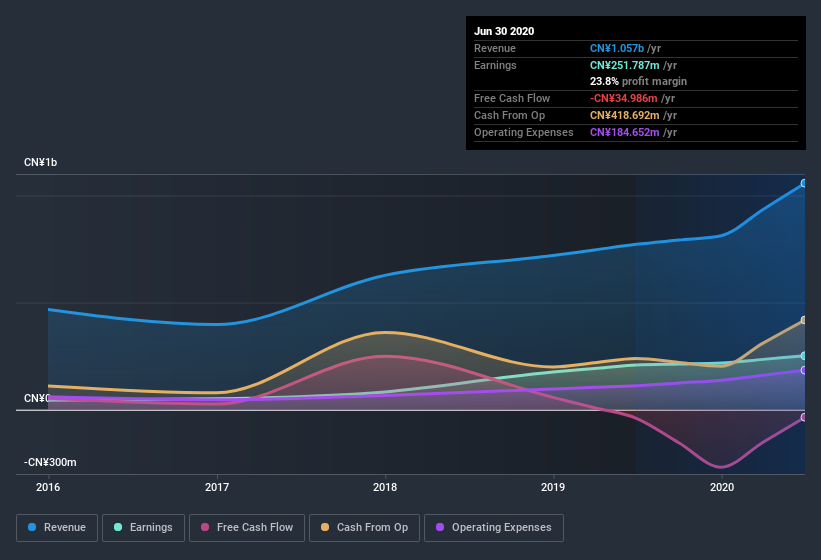- Hong Kong
- /
- Metals and Mining
- /
- SEHK:2798
Is There More To The Story Than Perennial Energy Holdings's (HKG:2798) Earnings Growth?
As a general rule, we think profitable companies are less risky than companies that lose money. That said, the current statutory profit is not always a good guide to a company's underlying profitability. In this article, we'll look at how useful this year's statutory profit is, when analysing Perennial Energy Holdings (HKG:2798).
We like the fact that Perennial Energy Holdings made a profit of CN¥251.8m on its revenue of CN¥1.06b, in the last year. In the chart below, you can see that its profit and revenue have both grown over the last three years.
Check out our latest analysis for Perennial Energy Holdings

Of course, when it comes to statutory profit, the devil is often in the detail, and we can get a better sense for a company by diving deeper into the financial statements. So today we'll look at what Perennial Energy Holdings' cashflow tells us about the quality of its earnings. Note: we always recommend investors check balance sheet strength. Click here to be taken to our balance sheet analysis of Perennial Energy Holdings.
A Closer Look At Perennial Energy Holdings' Earnings
As finance nerds would already know, the accrual ratio from cashflow is a key measure for assessing how well a company's free cash flow (FCF) matches its profit. The accrual ratio subtracts the FCF from the profit for a given period, and divides the result by the average operating assets of the company over that time. The ratio shows us how much a company's profit exceeds its FCF.
As a result, a negative accrual ratio is a positive for the company, and a positive accrual ratio is a negative. While it's not a problem to have a positive accrual ratio, indicating a certain level of non-cash profits, a high accrual ratio is arguably a bad thing, because it indicates paper profits are not matched by cash flow. Notably, there is some academic evidence that suggests that a high accrual ratio is a bad sign for near-term profits, generally speaking.
For the year to June 2020, Perennial Energy Holdings had an accrual ratio of 0.27. We can therefore deduce that its free cash flow fell well short of covering its statutory profit. In the last twelve months it actually had negative free cash flow, with an outflow of CN¥35m despite its profit of CN¥251.8m, mentioned above. We also note that Perennial Energy Holdings' free cash flow was actually negative last year as well, so we could understand if shareholders were bothered by its outflow of CN¥35m.
Our Take On Perennial Energy Holdings' Profit Performance
Perennial Energy Holdings' accrual ratio for the last twelve months signifies cash conversion is less than ideal, which is a negative when it comes to our view of its earnings. Because of this, we think that it may be that Perennial Energy Holdings' statutory profits are better than its underlying earnings power. The good news is that, its earnings per share increased by 7.5% in the last year. At the end of the day, it's essential to consider more than just the factors above, if you want to understand the company properly. If you want to do dive deeper into Perennial Energy Holdings, you'd also look into what risks it is currently facing. Our analysis shows 2 warning signs for Perennial Energy Holdings (1 is a bit concerning!) and we strongly recommend you look at them before investing.
Today we've zoomed in on a single data point to better understand the nature of Perennial Energy Holdings' profit. But there are plenty of other ways to inform your opinion of a company. Some people consider a high return on equity to be a good sign of a quality business. While it might take a little research on your behalf, you may find this free collection of companies boasting high return on equity, or this list of stocks that insiders are buying to be useful.
When trading Perennial Energy Holdings or any other investment, use the platform considered by many to be the Professional's Gateway to the Worlds Market, Interactive Brokers. You get the lowest-cost* trading on stocks, options, futures, forex, bonds and funds worldwide from a single integrated account. Promoted
New: Manage All Your Stock Portfolios in One Place
We've created the ultimate portfolio companion for stock investors, and it's free.
• Connect an unlimited number of Portfolios and see your total in one currency
• Be alerted to new Warning Signs or Risks via email or mobile
• Track the Fair Value of your stocks
This article by Simply Wall St is general in nature. It does not constitute a recommendation to buy or sell any stock, and does not take account of your objectives, or your financial situation. We aim to bring you long-term focused analysis driven by fundamental data. Note that our analysis may not factor in the latest price-sensitive company announcements or qualitative material. Simply Wall St has no position in any stocks mentioned.
*Interactive Brokers Rated Lowest Cost Broker by StockBrokers.com Annual Online Review 2020
Have feedback on this article? Concerned about the content? Get in touch with us directly. Alternatively, email editorial-team (at) simplywallst.com.
About SEHK:2798
Perennial Energy Holdings
An investment holding company, engages in the exploration and mining of coking coal in the People’s Republic of China.
Mediocre balance sheet and slightly overvalued.
Market Insights
Community Narratives




